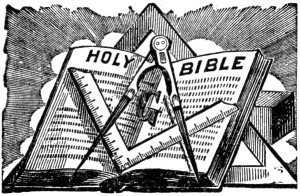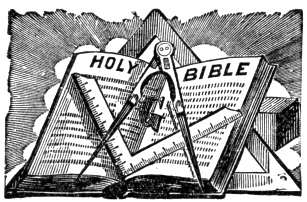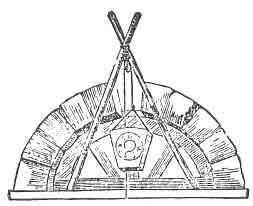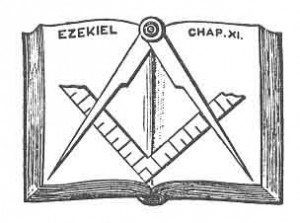J. W.–Will you be off, or from?
Conductor (for candidate.)–From.
J. W.–From what, and to what?
Conductor–From the real grip of a Fellow Craft to the pass grip of a Master Mason.
J. W.–Pass. (They now pass to the pass grip of a Master Mason. (See Fig. 16, p. 97.)
J. W.–What is that?
Conductor–The pass grip of a Master Mason.
J. W.–Has it a name?
Conductor–It has.
J. W.–Will you give it me?
Conductor–I did not so receive it, neither can I so impart it.
J. W.–How will you dispose of it?
Conductor–I will letter or halve it.
J. W.–Halve it, and begin.
Conductor–No, you begin.
J. W.–Begin you.
Conductor–Tu.
J. W.–Bal.
Conductor–Cain. (Pronounced by conductor–Tubal Cain.)
J. W.–The token is right, and the pass is right. You will pass on to the Senior Warden’s station in the west, for his examination.
They then pass on to this officer’s station, where the same questions and answers are repeated as at the Junior Warden’s station, and he (the Senior Warden) suffers them to pass on to the Worshipful Master’s station in the east. As they approach the Worshipful Master’s station, he says:
W. M.–Brother Senior Deacon, you will reconduct the candidate to the Senior Warden in the west, with my orders that he teach him how to wear his apron as a Master Mason.
The conductor then turns about to the Senior Warden in the west, and says:
Brother Senior Warden, it is the orders of the Worshipful
p. 99
[paragraph continues] Master that you teach this candidate how to wear his apron as a Master Mason.
The Senior Warden approaches the candidate and ties the apron upon him, with the flap and corners turned down, and says:
Master Masons wear their aprons
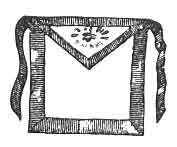 A MASTER MASON’S APRON. A MASTER MASON’S APRON. |
with the flap and corners down, to designate them as Master Masons, or as overseers of the work, and so you will wear yours.
The conductor now conducts the candidate back to the Worshipful Master in the east.
W. M.–Brother Gabe, as you are clothed as a Master Mason,1 it is necessary that you should have the working-tools or a Master Mason. (Master has a small trowel, which he shows the candidate as he commences to read concerning it.)
The working-tools of a Master Mason are all the implements of Masonry appertaining to the first
 TROWEL. TROWEL. |
three Degrees indiscriminately, but more especially the trowel.
The trowel is an instrument made use of by operative masons to spread the cement which unites a building into one common mass; but we, as Free and Accepted Masons are taught to make use of it for the more noble and glorious purpose of spreading the cement of brotherly love and affection; that
p. 100
cement which unites us into one sacred band, or society of friends and brothers, among whom no contention should ever exist, but that noble contention, or rather emulation, of who best can work and best agree.
W. M.–Brother Senior Deacon, you will now reconduct this candidate to the place from whence he came, and reinvest him with what he has been divested of, and await my further will and pleasure.
The conductor then leads the candidate to the centre of the Lodge, at the altar, and makes duegard and sign of a Master Mason (see Figs. 5, 6, pp. 17, 18), which is responded to by the Master, after which the conductor and candidate pass out of the Lodge. While they are going out, the Master gives three sounds with his gavel (• • •), and says, in a loud tone of voice:
W. M.–Brother Junior Warden, what is the hour? J. W.–High twelve, Worshipful.
W. M.–If you are satisfied it is high twelve, you will erect your column, and call the craft from labor to refreshment, for the space of thirty minutes (or fifteen minutes, as the case may be), calling them in at the sound of the gavel. On receiving this order, the Junior Warden takes from his desk a small wooden column, about eighteen inches in length, and sets it in an upright position at his right hand, and at the same time he gives three raps (• • •) with the gavel, and says:

Moe is the founder of GnosticWarrior.com. He is a father, husband, author, martial arts black belt, and an expert in Gnosticism, the occult, and esotericism.

